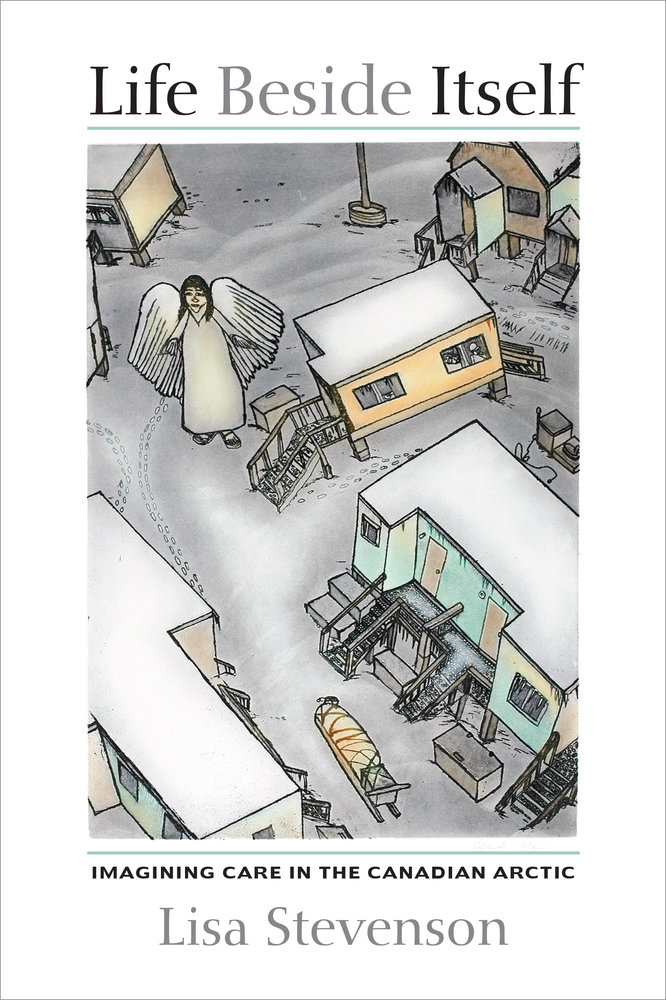LISA STEVENSON
Bio
Writing
Life Beside Itself
Selected Academic Publications
Other publications
Film
Courses
CV
Contact
Bio
Writing
Life Beside Itself
Selected Academic Publications
Other publications
Film
Courses
CV
Contact
Winner of J.I. Stanley Prize, School for Advanced Research
2015 Victor Turner Prize for Ethnographic Writing, Society for Humanistic Anthropology
In Life Beside Itself, Lisa Stevenson takes us on a haunting ethnographic journey through two historical moments when life for the Canadian Inuit has hung in the balance: the tuberculosis epidemic (1940s to the early 1960s) and the subsequent suicide epidemic (1980s to the present). Along the way, Stevenson troubles our commonsense understanding of what life is and what it means to care for the life of another. Through close attention to the images in which we think and dream and through which we understand the world, Stevenson describes a world in which life is beside itself: the name-soul of a teenager who dies in a crash lives again in his friend’s newborn baby, a young girl shares a last smoke with a dead friend in a dream, and the possessed hands of a clock spin uncontrollably over its face. In these contexts, humanitarian policies make little sense because they attempt to save lives by merely keeping a body alive. For the Inuit, and perhaps for all of us, life is “somewhere else,” and the task is to articulate forms of care for others that are adequate to that truth.
Reviews:
2015 Victor Turner Prize for Ethnographic Writing, Society for Humanistic Anthropology
In Life Beside Itself, Lisa Stevenson takes us on a haunting ethnographic journey through two historical moments when life for the Canadian Inuit has hung in the balance: the tuberculosis epidemic (1940s to the early 1960s) and the subsequent suicide epidemic (1980s to the present). Along the way, Stevenson troubles our commonsense understanding of what life is and what it means to care for the life of another. Through close attention to the images in which we think and dream and through which we understand the world, Stevenson describes a world in which life is beside itself: the name-soul of a teenager who dies in a crash lives again in his friend’s newborn baby, a young girl shares a last smoke with a dead friend in a dream, and the possessed hands of a clock spin uncontrollably over its face. In these contexts, humanitarian policies make little sense because they attempt to save lives by merely keeping a body alive. For the Inuit, and perhaps for all of us, life is “somewhere else,” and the task is to articulate forms of care for others that are adequate to that truth.
Reviews:
"This courageous humanistic work is well worth a close and critical read, for the simple reason that its author, Lisa Stevenson, addresses one of the most important contemporary healthcare issues in the Canadian North—that of suicide— and along the way challenges the reader through been termed welfare colonialism and continues to struggle with a bureaucratic legacy determined by historical state structure and policy."—American Anthropologist
"Stevenson's work is an example of classic but contemporary ethnography and an exemplar of what it means to find meaning in subverted contexts of action and thought. By centering uncertainty as the mode, Stevenson implores that thick description comes not only from the meanings people construe, or ostensibly know and understand in the everyday moments of their lives, but also in the absence of any knowing."—Anthropology and Humanism
"Drawing on material from all over the world, she examines care as a product of colonialism – measuring success by the prevention of death, regardless of the effects of such efforts on the lives of the people concerned."—Anthropologica
"Stevenson explores how care in Inuit communities is like a raven, a spiritual force that binds the living and the dead in ways that are not always straightforward or obvious."—CHOICE
"Life Beside Itself is a profound reflection on the psychic life of biopolitics and how the biopolitical state, committed to enhancing the life of the population, renders lifeless a people’s particular form of life. Lisa Stevenson writes with attentiveness to the care that binds the living and the dead in Inuit communities. That is itself a form of ethical living. Her writing is surely touched by grace. Her book illuminates the problem of suicide as the light of the moon illuminates a darkened sky. She helps us not to turn away from this suffering but to hold it. This book is truly a treasure."—Veena Das, author of Affliction: Health, Disease, Poverty
